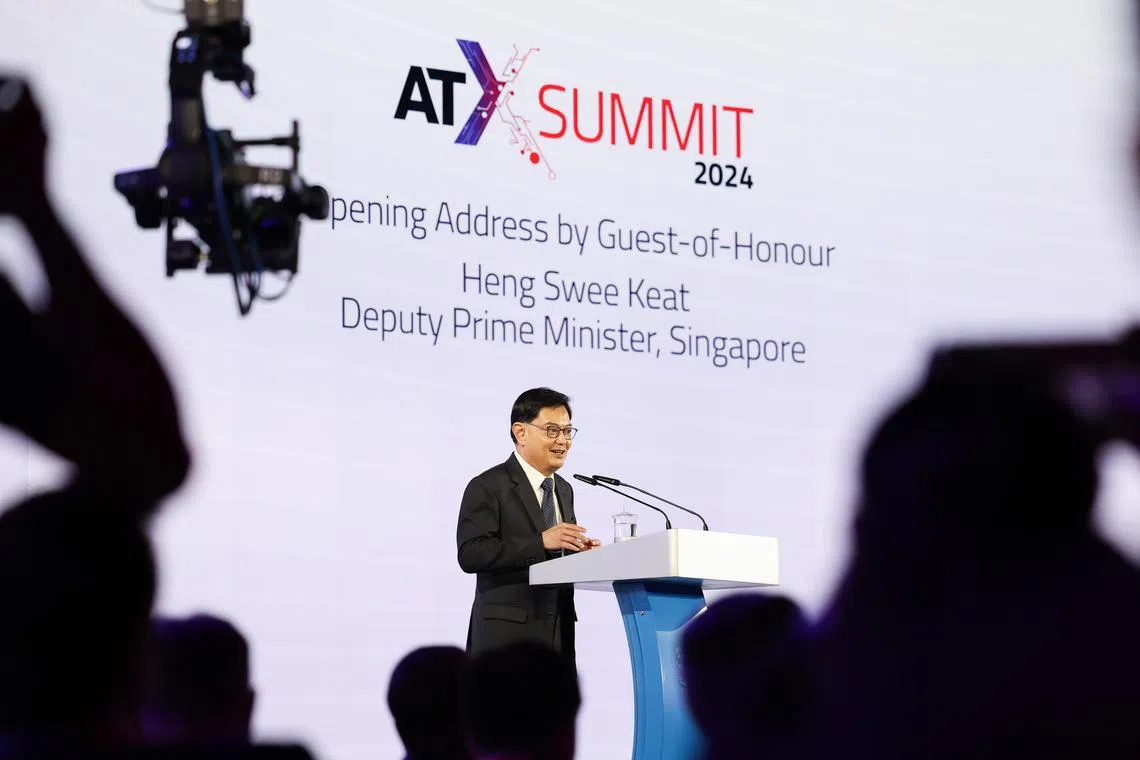S’pore adds another $300m in investment to develop quantum computers, talent pool
Sign up now: Get ST's newsletters delivered to your inbox

Deputy Prime Minister Heng Swee Keat speaking at the Asia Tech x Summit at Capella Singapore on May 30.
ST PHOTO: BRIAN TEO
SINGAPORE – Singapore’s quest to establish itself as a quantum powerhouse has received a nearly $300 million investment top-up over the next five years as a global race to deploy next-generation computers heats up.
The sum will be spent on studies, grooming 100 local experts each from the PhD and master’s levels, and offering grants to research efforts to build quantum computers and equipment locally.
The $295 million top-up adds to the $400 million research and development budget that the authorities have poured into quantum technology since 2002, when the National Research Foundation made its first investments.
The investment and plans for the quantum sector were announced on May 30 by Deputy Prime Minister Heng Swee Keat, who spoke at the Asia Tech x Summit held at Capella Singapore. The conference from May 29 to 31 gathers global tech industry players for talks and discussions on digitalisation.
Quantum computers can use the properties of light or atoms to solve problems too complex for traditional computers, and are tipped to lead to new breakthroughs in medicine, materials and better artificial intelligence (AI).
Announcing the National Quantum Strategy, DPM Heng said that just like digitalisation during the Covid-19 pandemic
The technology is tipped to deliver far higher processing capabilities that will advance many areas, such as drug discovery, enhanced cyber security and more advanced AI models, he added.
The quantum sector is expected to create between $600 billion and $1.1 trillion in economic value globally in the next 30 years, according to estimates from Boston Consulting Group.
Technology giants such as IBM, Google and others from China have made headway in the race to a quantum computer, but have yet to release it to the market.
“However, there are still many challenges to realising the quantum computer,” DPM Heng said, adding that developers are working out how best to cool the systems and improve the accuracy of the computers’ results.
“Researchers across the world are also pursuing different approaches to achieve scale in quantum computing and to be commercially viable,” he said.
As part of Singapore’s quantum strategy, the $295 million allocated from the Research, Innovation and Enterprise 2025 plan will prioritise four areas: scientific studies, talent, enterprise and engineering capabilities, the National Quantum Office said in a statement.
The office will lead the national efforts, overseeing the quantum computing ecosystem from business ventures to academia.
Among its priorities is to build Singapore’s own quantum processors to ensure that it remains competitive globally.
It aims to oversee the development of chips across various quantum processing platforms while the technology shapes up, physicist Jose Ignacio Latorre from the Centre for Quantum Technologies said during a briefing on May 28.
Different global platforms explore various methods to build quantum processors, each utilising different physical properties to generate quantum calculations.
The focus across various platforms will go a long way to helping Singapore be competitive, whatever direction that quantum research takes, said Professor Latorre.
To support the expansion of the quantum field here, a total of 200 PhD- and master’s-level students will be offered local scholarships to grow Singapore’s quantum talent pool, which has about 350 researchers, including students, said National Quantum Office executive director Ling Keok Tong.
The National Quantum Office will also issue grant calls to researchers to work with the industry on ways to overcome key technical hurdles on nascent platforms.
In addition, researchers will focus on building quantum sensors such as biomedical imaging tools and remote sensing to detect underground deposits of precious materials. Quantum sensors have the potential to detect very small changes in the environment and can be used in environmental monitoring, civil engineering and precise navigational systems, said the office.
Researchers will also explore neural studies using quantum, which can potentially allow thoughts to be translated.
Prof Latorre said: “I do think in the next five years, we will see amazing machines, and we have to be there as a First World country.”


